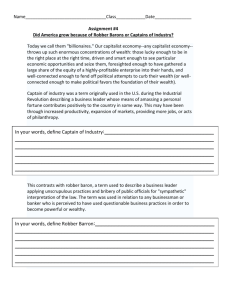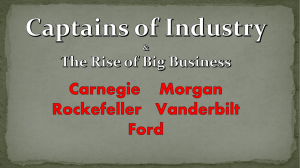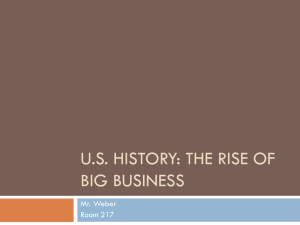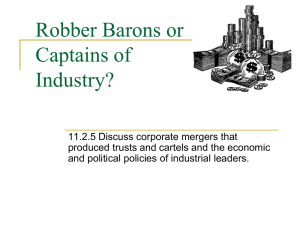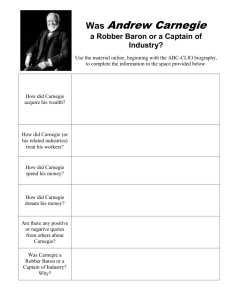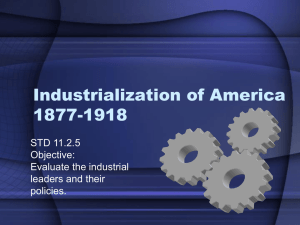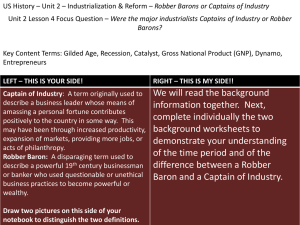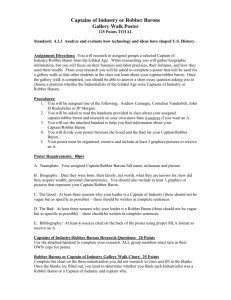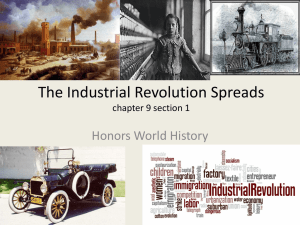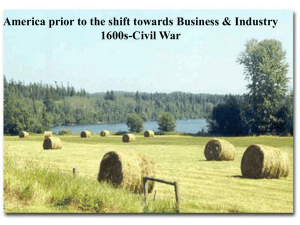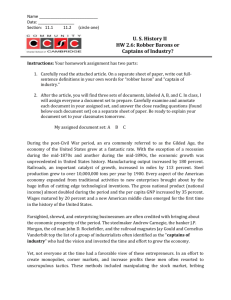The Captains of Industry - pams
advertisement
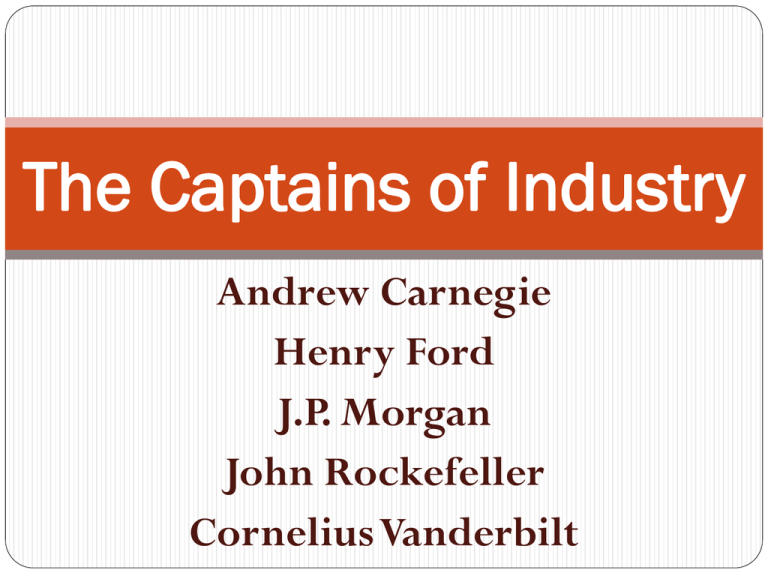
The Captains of Industry Andrew Carnegie Henry Ford J.P. Morgan John Rockefeller Cornelius Vanderbilt Terms to Know? Robber Baron The term may now relate to any businessman or banker who used questionable business practices to become powerful or wealthy. May use political means to achieve their ends Captain of Industry Term for a business leader whose means of making a personal fortune contributes positively to the country. May be through increased productivity, expansion of markets, providing more jobs, or acts of charity and philanthropy Andrew Carnegie = steel He was born in Scotland and worked as a bobbin boy and a telegraph operator. He then worked for the Pennsylvania Railroad. “You cannot push anyone up the ladder unless he is willing to climb.” “The first man gets the oyster, the second man gets the shell.” VIDEO Andrew Carnegie = steel How he acquired his wealth: Gained control of every step of the steel making process Carnegie Steel Company How he (or his related industries) treated workers: Homestead strike: locked out workers who demanded more money. Hired a private army to take control. 9 workers were killed. How he spent his money: books, music, and the fine arts How he donated his money: “Gospel of Wealth” (rich had a duty to improve society); Libraries Robber Baron or Captain of Industry? Henry Ford = automobiles He was born in 1863 near Detroit, Michigan. At the age of 16 he got a job with a machinist because he had always been fascinated with machines “A business that makes nothing but money is a poor business” “Don't find fault, find a remedy.“ VIDEO Henry Ford = automobiles How he acquired his wealth: Automobile assembly line Ford Motor Company How he (or his related industries) treated workers: High wages for workers; 40-hour work week Demanded “Socially Moral” employees How he spent his money: Racecars How he donated his money: Created a museum Paid children’s hospital bills Robber Baron or Captain of Industry? J.P. Morgan = steel & banking He was a wealthy banker that bought U.S. Steel. He had so much money, he loaned money to the U.S. government! He spent money on art, yachts, and fine champagne! Titanic near-miss! He willed his art to the Metropolitan Museum of Art in NY City! “Go as far as you can see; when you get there, you'll be able to see farther.” “A man always has two reasons for doing anything--a good reason and the real reason.” J.P. Morgan = steel & banking How he acquired his wealth: Accounting and banking; used trusts to control American industry How he (or his related industries) treated workers: Coldly rational; used aggressive tactics to root out troublemakers How he spent his money: Art; cigars; gems; yachts first house in NY to have electricity How he donated his money: Libraries; Art museums Robber Baron or Captain of Industry? John D. Rockefeller = oil He started out being a bookkeeper and then went into the grain business. He then invested in oil. (Standard Oil) He had a monopoly on the oil business by owning 85% of the oil in the U.S.! Rockefeller gave away about $550 million to charities! Colonial Williamsburg was restored thanks to him! “ “I have ways of making money that you know nothing of. “ “Competition is a sin.“ John D. Rockefeller = oil How he acquired his wealth: bought out oil companies controlled most of the refining and shipping process How he (or his related industries) treated workers: Bought out competition price slashing How he spent his money: Simple and frugal personal life How he donated his money: Universities organization to set up free high schools Robber Baron or Captain of Industry? Cornelius Vanderbilt = Railroads Started with steamboats in competition with Fulton. Then built the New York Central Railroad system and then the Grand Central Railroad. “I have been insane on the subject of moneymaking all my life” “You have undertaken to cheat me. I won't sue you, for the law is too slow. I'll ruin you.” “What do I care about law? Ain't I got the power?” Cornelius Vanderbilt = Railroads How he acquired his wealth: railroads (The Central Railroad) & shipping How he (or his related industries) treated workers: Building the Grand Central Terminal helped employ thousands. Workers were paid very little and worked long hours. How he spent his money: Built a yacht and toured Europe; Staten Island mansion; Biltmore Estate How he donated his money: Largest endowment to a University; wife’s church; left 95% of estate to eldest son Robber Baron or Captain of Industry?
